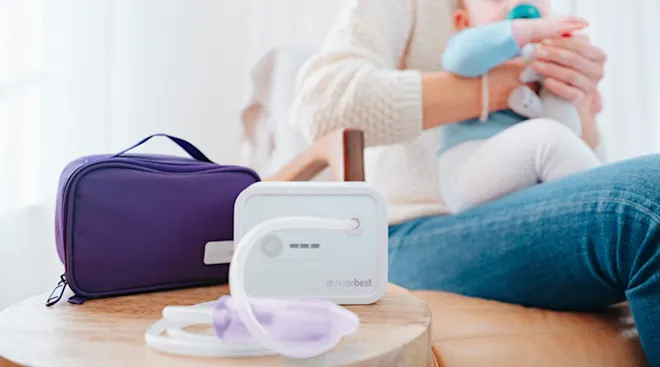5 Common Kid Ailments: When to Call the Doctor and When to Wait It Out
Babies and toddlers unfortunately don’t come with instructions, and it’s hard to always know what’s normal and what’s cause for concern. When your little one gets sick, parents constantly wonder when it’s best to just ride it out, when to call the pediatrician during office hours and when to make an emergency call in the wee hours of the morning.
If you’re worried about your child, your pediatrician would always rather you call them rather than rely on “Doctor Google” and gather misinformation on the Internet. That said, there are times when it’s okay to first try treating your child at home. (After all, no one wants to drag a sick kid to sit in a doctor’s waiting room unnecessarily.) Here are the top five concerns we’re often asked about, along with tips for when to wait it out and when to call the doctor.
When to handle things at home
A fever doesn’t always mean an automatic trip to the doctor’s office: It depends on the age of the child, how they look and other associated symptoms. Older babies and children often get fevers ranging from 101 degrees Fahrenheit to even 105 degrees Fahrenheit—which sounds like a scary-high number, but it’s quite common in children! A pediatrician is often more concerned about how a child looks than what the number says on a thermometer.
For example, if a child has a fever of 105 and is given ibuprofen (if over 6 months old) and the child is happy and playful, your doctor is going to be less concerned than if a child has a lower fever of 101 and is having difficulty breathing (i.e., breathing very fast, audibly wheezing or sucking in the muscles on their chest and the rib outline can be seen).
If your child is healthy and not a young baby, you can give them a fever reducer and watch how they respond. If they’re acting like themselves, you may not have to rush into your pediatrician’s office right away. Instead, give the fever a day or two to break on its own. Remember that acetaminophen (Tylenol) and ibuprofen (Motrin or Advil) don’t cure the fever; a temperature spike can come back when the medicine wears off. A fever is a sign that your child’s body is fighting an infection.
When to call the doctor
Always call your doctor if baby is under 2 months old with a rectal temperature of 100.4 degrees Fahrenheit or above, or if your child has a compromised immune system (such as cancer, doesn’t have a spleen, is on medications that suppress the immune system or has sickle cell disease). Other concerning signs that warrant a call to the doctor include having a fever along with:
- a very stiff neck with light hurting their eyes and vomiting
- a severe headache
- stomach that’s tender to the touch
- a rash
- seizures
- severe sore throat affecting a child’s ability to swallow or move their neck
- persistent vomiting and diarrhea with signs of dehydration (not wetting diaper every six to eight hours, no tears when they cry or very dry lips)
- excessive sleepiness/not able to arouse easily (more so than just from being under the weather)
In any child, an objective fever—meaning a temperature of 100.4 to 101 degrees Fahrenheit that’s established using a thermometer and not just by feeling a child’s head—that lasts for more than two to three days calls for a visit to the pediatrician.
When to handle things at home
Stomach pain is one of the most common complaints we get as pediatricians, and it’s often hard to tell what causing it in young children. Is it hunger? Gas? Stress-related? Or do they just have to poop? Have your child relax, try to see if you can localize where the pain is coming from (this will give you doctor more clues about the cause of the pain), rub their belly and see if they want to eat. If you’re still unsure and the pain persists, then check in with your pediatrician.
When to call the doctor
If you think your child is having stomach pain, a good test to gauge the severity is to touch their stomach. If your child seems to be in a lot of pain when being touched—like if they cry when you touch their tummy or swipe your hand away—then they should be seen by their doctor. If the pain is rapidly increasing or if it increases when they’re in a car going over bumpy roads, that warrants a call to your doctor. We also use the “jump” test: If your child can walk and jump well, (which puts pressure on the abdomen), then most likely the stomach pain doesn’t warrant an emergency room visit.
A few causes of stomach pain where your child needs to see a doctor include constipation (hard, pebble-like stools; straining when having a bowel movement or in pain), urinary tract infections (pain in the lower abdomen/bladder area, along with pain and burning when urinating; funny-smelling urine; blood in the urine; wetting the bed or having more accidents) and strep throat, which can present in children around 3 years old with a sore throat, fever, abdominal pain, sandpaper-like rash on the body, headache or vomiting. Signs of appendicitis—severe stomach pain starting by the belly button and then moving to the right lower side, stomach tenderness when touched, along with fever, not wanting to eat and vomiting—might mean an immediate trip to the ER.
When to handle things at home
When children become mobile, we get frequent phone calls after parents turn their head for a split second and the child rolls, jumps, slips, climbs or falls and gets injured. If it’s a minor injury, such as a child falling from their own sitting position, and they’re remaining alert, happy, playful and is acting like themselves, they’re likely fine. Even if it’s a minor injury, however, we still recommend keeping an eye out for the warning signs mentioned below and to wake your child up after about an hour of napping or sleeping to make sure they’re easily arousable.
When to call the doctor
Any fall from a high height, or if your child loses consciousness, has a seizure or a bad headache, is vomiting, very sleepy, not walking normally/off balance, confused or very irritable warrants a call to the pediatrician and a potential trip to the emergency room. Since the head is a very vascular area, a bump might cause some swelling. Icing the area will help, but if it’s very tender, has a spongy feeling to it or it’s more than a slight bump, it’s best to call your pediatrician and determine if your child needs to be seen.
When to handle things at home
Ah, the dreaded case of vomiting and diarrhea—aka the stomach bug (or viral gastroenteritis). If your child only vomits a few times; is keeping small sips of breast milk, formula or electrolyte solution down (start with one teaspoon every 5 to 10 minutes of electrolyte solutions such as Pedialyte and slowly increase the amount to larger volumes); has minimal or no stomach pain and is otherwise acting well, then the bug will likely pass and you don’t need to visit your pediatrician. Just make sure your little one gets lots of rest and hydration.
When to call the doctor
Kids can often vomit multiple times over 24 hours and may have fever and diarrhea. But if your child is vomiting for more than 24 hours, can’t hold down even small sips of liquids or is vomiting bright green liquid (bile), your pediatrician should be notified right away to make sure your child isn’t becoming dehydrated (such as not having a wet diaper every four to six hours, has dry lips and mouth, doesn’t produce tears when crying, infants’ fontanelle is sunken in, or is acting very weak and sleepy) or has something more serious going on than just a stomach bug.
When to handle things at home
Wintertime brings lots of runny noses, sneezes and coughs. In fact, in the first two years of life, most children will have around eight to 10 colds. If your child is coughing but doesn’t have a fever, is breathing normally and otherwise acting like themselves, you can likely give the cough a few days without checking in with your pediatrician. Most colds take eight to 10 days to go away. Also, just because your child’s snot has turned from clear to yellow doesn’t mean there’s an infection that needs antibiotics.
Try simple things to help alleviate the cough, such as having a cool mist humidifier in the room (which helps keep the air from being dry) or running a hot shower and sitting with your little one on the toilet for 10 minutes or so. A few drops of saline in each nostril and the occasional suction of dry mucus in the nostrils might also make your child more comfortable.
When to call the doctor
If baby is under 3 months old, it might be difficult to tell how sick your child is or if the cold is turning into something more serious than the common cold, so a call to your pediatrician is warranted. Other signs to see your pediatrician right away include if your child is having any difficulty breathing (taking shallow or rapid breaths, flaring their nostrils with each breath to get more air in, or retracting, which means the skin by the ribs is being sucked in so you can see the outline of the ribs), the cough is getting progressively worse instead of gradually getting better, the fever is going on more than two to three days, or your child is very cranky or much more sleepy than normal.
If you’ve decided it’s time to call your pediatrician and it happens to be outside of normal office hours, there are a few things to know to help make the call a productive one. Here, some helpful hints on what to have prepared before dialing:
• Have details at the ready. Your pediatrician is likely not at the office, and the on-call physician may not know your child’s history and doesn’t have your child’s record in front of them. Make sure you share any information they might need to know to help you assess the situation better, such as if your child has underlying medical conditions (such as a compromised immune system, diabetes, heart issues, severe asthma or kidney issues) or was recently in the hospital or emergency room. Knowing your child’s weight is also helpful if the doctor recommends an over-the-counter medicine.
• Make sure you’re reachable by phone. It sounds simple, but remember to have your phone on, make sure you can accept blocked numbers and that your voicemail can accept messages. Your pediatrician will want to be able to connect with you as soon as possible to help your child.
• Listen to directions on the office answering service. If you need an appointment for your child and the doctor’s office is closed, pay close attention to the recorded phone message. Often it will tell you the office hours and when to call back to make an appointment. The emergency doctor on call is typically not in the office and won’t be able to book you a next-day appointment from their home.
• When in doubt, talk to the on-call doctor. If you’re not sure if your child needs immediate attention, paging the emergency doctor could help guide you in your decision-making.
Meet Dina DiMaggio, MD, and Anthony F. Porto, MD, MPH, official spokespeople for the American Academy of Pediatrics and the co-authors of The Pediatrician’s Guide to Feeding Babies and Toddlers. They write about the latest AAP guidelines, studies and seasonal issues affecting babies and toddlers. Follow them on Instagram @pediatriciansguide.
Published December 2018
Please note: The Bump and the materials and information it contains are not intended to, and do not constitute, medical or other health advice or diagnosis and should not be used as such. You should always consult with a qualified physician or health professional about your specific circumstances.
Plus, more from The Bump:
Navigate forward to interact with the calendar and select a date. Press the question mark key to get the keyboard shortcuts for changing dates.




















































